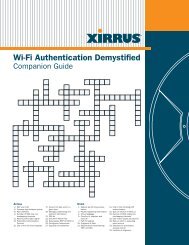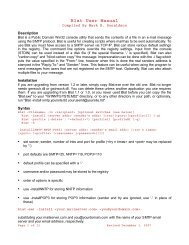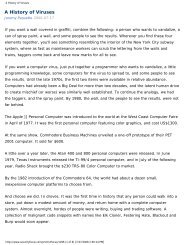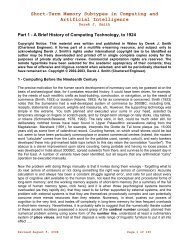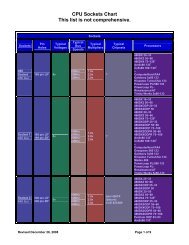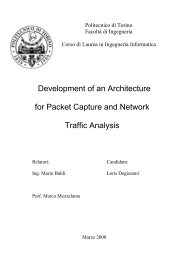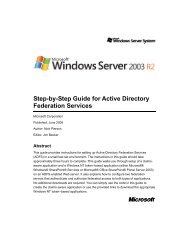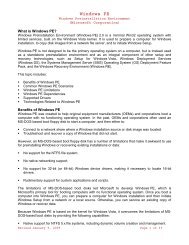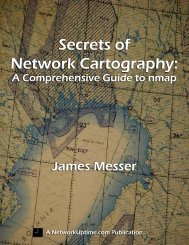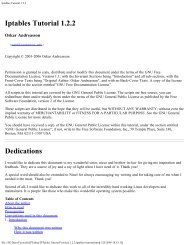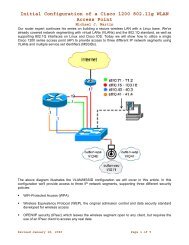SCO UnixWare 2.1 Technical Summary - Bandwidthco Computer ...
SCO UnixWare 2.1 Technical Summary - Bandwidthco Computer ...
SCO UnixWare 2.1 Technical Summary - Bandwidthco Computer ...
Create successful ePaper yourself
Turn your PDF publications into a flip-book with our unique Google optimized e-Paper software.
An <strong>SCO</strong> <strong>Technical</strong> White Paper Version <strong>2.1</strong>.2<br />
<strong>SCO</strong> <strong>UnixWare</strong> <strong>2.1</strong> Software Development Kit (SDK)<br />
The SDK (an optional add-on product) consists of the application programming interface libraries<br />
as well as the basic tools that the applications developer can use to create applications for the<br />
Application Server or for the Personal Edition version of <strong>SCO</strong> <strong>UnixWare</strong>. The tools are<br />
particularly suitable for developing graphical and network applications. The major components<br />
include:<br />
42<br />
• C compilation system (part of base product)<br />
• Application Programming Interfaces (APIs) and libraries<br />
• desktop manager development<br />
• enhanced debugger<br />
• kernel debugger<br />
• IHV development kit<br />
• graphics development package<br />
• Motif development package<br />
• network management software development kit<br />
• Software Development Kit documentation<br />
• software packaging tools<br />
C and C++ Compilation Systems<br />
The C and C++ compilation systems have been optimized for the Pentium and Pentium Pro<br />
processors. The C++ compiler and the C++ Standard Components Class Library enable the use<br />
of modern object-oriented programming techniques. The C and C++ compilation systems<br />
support both shared object libraries and dynamic linking.<br />
Application Programming Interfaces (APIs)<br />
A complete set of application programming interface (API) library routines and related toolkits<br />
and documentation are provided to simplify the creation of distributed client-server applications,<br />
and networked, graphical and multithreaded applications. The libraries and toolkits provided with<br />
the SDK for this purpose include:<br />
• User threads support library: an enhanced set of APIs for providing high performance<br />
synchronization, scheduling and user-level threads facilities. Included are routines to create<br />
threads, terminate threads, wait for threads, and adjust threads’ scheduling characteristics.<br />
• Thread safe libraries: the libraries libc, libm and libnsl have been made thread-safe to<br />
support multithreaded applications. This ensures that parallel threads which call the same<br />
library function will not interfere with each other.<br />
• X Server Graphics Development Package: provides basic library and header file support<br />
for programming in the X11R5 environment. This includes the font server, X server, Xlib and<br />
X intrinsics. Clients and utilities used to support <strong>SCO</strong> <strong>UnixWare</strong> X Server development are<br />
also included.<br />
• Desktop Manager Development Package: provides the desktop manager API support<br />
including the drag-and-drop and help APIs. It provides a variety of graphics libraries and<br />
tools to support the graphics capabilities in <strong>SCO</strong> <strong>UnixWare</strong>.<br />
• Motif Development Package: provides the Common Desktop Environment Motif toolkit,<br />
based on OSF/Motif 1.2.3. It provides the tools necessary to develop applications using<br />
Motif.<br />
• Network Development Package: provides the header files and libraries for writing<br />
networking programs which use XTI/TLI, RPC, sockets, network selection facility, and nameto-addressing<br />
APIs.<br />
• NetWare Development Package: provides development header files and libraries for writing<br />
and debugging network management, IPX/SPX, and NetWare-aware client applications.



